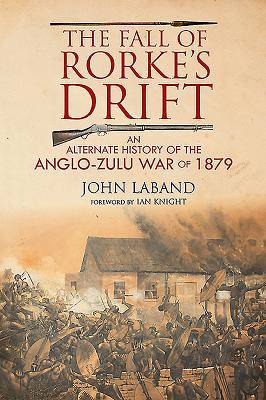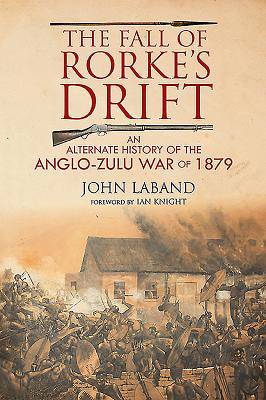
En raison d'une grêve chez bpost, votre commande pourrait être retardée. Vous avez besoin d’un livre rapidement ? Nos magasins vous accueillent à bras ouverts !
- Retrait gratuit dans votre magasin Club
- 7.000.000 titres dans notre catalogue
- Payer en toute sécurité
- Toujours un magasin près de chez vous
En raison de la grêve chez bpost, votre commande pourrait être retardée. Vous avez besoin d’un livre rapidement ? Nos magasins vous accueillent à bras ouverts !
- Retrait gratuit dans votre magasin Club
- 7.000.0000 titres dans notre catalogue
- Payer en toute sécurité
- Toujours un magasin près de chez vous
The Fall of Rorke's Drift
An Alternate History of the Anglo-Zulu War of 1879
John Laband
Livre relié | Anglais
27,95 €
+ 55 points
Description
It is January 1879, and the British Empire and the Zulu Kingdom are at war. Lord Carnarvon, Secretary of State for the Colonies, who had successfully brought about federation in Canada in 1867, had believed a similar scheme would work in South Africa. But such plans are rejected by Boer leaders. Lord Chelmsford leads a British military expeditionary force to enter the Zulu Kingdom uninvited. A bloody battle ensues on 22 January 1879 at Isandlwana. The Zulus are the unexpected victors.
After that brutal defeat, the British Army are at Rorke's Drift on the Buffalo River in Natal Province, South Africa. A few hundred British and colonial troops led by Lieutenants John Chard of the Royal Engineers and Gonville Bromhead face the might of the Zulu army of thousands led by Prince Dabulamanzi kaMpande (CORR). Against the odds the British are victorious and this defeat marks the end of the Zulu nation's dominance of the region.
The Defence of Rorke's Drift would go down in history as an iconic British Empire Battle and inspired Victorian Britain. Eleven Victoria Crosses were awarded to military personnel. But what if the Zulus had defeated the British at Rorke's Drift and invaded Natal?
In the first ever alternate history of the Anglo-Zulu War, historian John Laband asks that question. With his vast knowledge of the Anglo-Zulu War he turns history on its head and offers a tantalizing glimpse of a very different outcome weaving a compelling and never-before told story of what could have been.
After that brutal defeat, the British Army are at Rorke's Drift on the Buffalo River in Natal Province, South Africa. A few hundred British and colonial troops led by Lieutenants John Chard of the Royal Engineers and Gonville Bromhead face the might of the Zulu army of thousands led by Prince Dabulamanzi kaMpande (CORR). Against the odds the British are victorious and this defeat marks the end of the Zulu nation's dominance of the region.
The Defence of Rorke's Drift would go down in history as an iconic British Empire Battle and inspired Victorian Britain. Eleven Victoria Crosses were awarded to military personnel. But what if the Zulus had defeated the British at Rorke's Drift and invaded Natal?
In the first ever alternate history of the Anglo-Zulu War, historian John Laband asks that question. With his vast knowledge of the Anglo-Zulu War he turns history on its head and offers a tantalizing glimpse of a very different outcome weaving a compelling and never-before told story of what could have been.
Spécifications
Parties prenantes
- Auteur(s) :
- Editeur:
Contenu
- Nombre de pages :
- 256
- Langue:
- Anglais
Caractéristiques
- EAN:
- 9781784383732
- Date de parution :
- 12-06-19
- Format:
- Livre relié
- Format numérique:
- Genaaid
- Dimensions :
- 160 mm x 236 mm
- Poids :
- 566 g

Les avis
Nous publions uniquement les avis qui respectent les conditions requises. Consultez nos conditions pour les avis.






